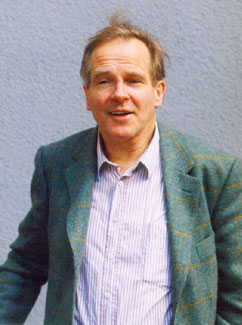
|
Jacket 17 — June 2002 | # 17 Contents | Homepage | Catalog | |
Schuldtfrom: Homi Bhabha and the Forty Words —The Locution of Culture, Smothered in its Gratitudes |
|
First published by Black Square Editions, 1999 Part OneWho is Who
The following piece is an open-ended tale of desire. Unlike many a love story, it has plenty of characters. It is about broken hearts uttering themselves in broken language. That language, of course, is just a lucky find. The sexes are so different! That must be why we encounter so many expressions of difference in this piece, and again, so many words for bridging or fudging or splitting the difference. Add to this the well-documented fact that the sexes are thickly, horribly and unjustly overlaid with gender, and you get some measure of what we are all up against, not least the poet writing about it. The obscenities in the poem, if any, are unintended and not of my doing. This is found language. I just use the stuff straight from the can. The poem might have been called Couples of the Would-be, or with equal justification: Spiral Binding, or with a vowel shift propelling us toward descriptive accuracy, Spiral Bonding, and with progressive degrees of veracity (“I tweak veracity from varsity”) one might divulge that it is Homi Bhabha on Love, or rather Homi Bhabha on the Difference of Love, or in fact, Homi Bhabha on the Love of Difference. Let me add a quick rider for those of you who are unsure of who Prof. Bhabha is, a world-renowned figure who travels the globe from conference to conference while holding simultaneous appointments at the University of Chicago and the equally prestigious London School of Economics: Someone once said that “Homi Bhabha can get through a thirty minute talk using no more than forty words forever churned around. Talk about the sestina. That’s nothing compared with Homi Bhabha.” And someone, who must have made a more in-depth study of Prof. Bhabha’s output, said: “Homi Bhabha can get through a thirty minute talk using no more than forty words, and the striking thing is that not one of them means anything.” It should be obvious that I do not agree with this assessment, for if I thought that these words had no identifiable flavor of their own, I would hardly want to use them in a poem. |
The NamesThe names in the poem come from a trove painstakingly researched. Those of the women who must once have been envisaged as girls in their first blush speak of the hopes and preciousness and longings of plain folks endowing the names of their children with a certain luminosity; speak of dreams for the childen, of notions of personalizing a name, and I have no doubt that their deliberate spellings are carefully molded caresses. The names of the men are more of a mixed batch. Less overt sweetness has been invested in this field or thought appropriate, and I have also reached for shopworn regular standbys so as to add a dash of salt to the custard and put some grit into the reverie of romance. The only other additions I have made to the original phrases lifted from my source are wants to, oryearns to, etc., inserted in order to pursue the story I had to tell but also in order to overcome the near absence of verbs, though occasionally a verb came with the phrase and was retained. Replacing nounsA simple and common method for modifying any text is “N + n”. In this formula, “N” stands for the noun, “n” for an indefinite number to which the “author” of the resultant text (i.e. the method user) can assign any numeric value as long as it is a whole number such as 1, 2, or 3. Fractions will not work. Each noun in the text is then replaced by the n-th noun following it in a dictionary. How different the replacement noun will be from the one it replaces depends both on the dictionary selected and on the numerical value assigned to n. Members of the French Oulipo group have promoted small dictionaries and n= 7, but other values are just as feasible and may be as valuable, more valuable, less valuable. An Extreme ValueBy trial and error one can establish which number (and dictionary) will shed the most light on a given text, whether by distanciation, disrobing, dissimulation, dissing, disaffection, disturbance, dissection, disaster design, dizzy desire, or diss-construction. The poem presented on the following pages is unique because the substitutions in the discourse were all made with an extreme value for n that has never before been attempted in the history of literature, and that will certainly never be surpassed. Experimenting with figures up to 20 on several rather different dictionaries, the value found to be most revelatory was invariably n = 0. n = 0! You’ve got to hand it to the man. — Schuldt |
Homi Bhabha and the Forty Words
Jacalyne longs to be re-read by Woody. Part TwoMimicry Grasped InstantlyThe Acknowledgements Series This is not just instant. It is all grasped. Not just mimicry. Poetry. In subtle shifts and twists the material is bestirring itself, and as it comes alive, iridescent effects are revealed, cameos proffered, or those succinct and sweeping statements laid bare that more commonly gravitate to fortune cookies whose inner void they never fail to fill to the brim. Whatever there is, whatever you see, has been transformed. It is what it is. And something else as well. And it is also what it was before the poet got to it, or the word voider and -feeder, as Walter Savage Landor’s South Sea king addresses his interpreter in London. So it is what it was, too. Maybe. Probably. Who knows. It’s a tricky issue and one known to have caused many an itch. At any rate, we are not in a documentary here. Though mostly the words are the same as in another book (the one that can be considered the source or quarry), in poetry they may be uprooted or recognized for what they really are or they may form a purely coincidental overlay or a parallel world. The same words other. Only one thing is certain: this does not make them more innocent. It
In remembrance of Amadou Diallo I Am
I A Source of ParentsAlthough our different lives are now being lived Accounts I
Debits Accounts II
Credits The Fortune CookiesImpressions from an Obstacle Course
Memory is not best served by gratitude. Neat people shall be accommodated in places of acknowledgement. The hazards we receive are more help. Many ideas are sparked off by novels. Evolution owes a debt to interrogators and co-conspirators. Most of those sit at our kitchen table. Ideas and dialogues provide a skein of people and places. Acquaintance often turns into friendship. The help we receive is a more haphazard affair. A pioneer provides him with a critical terrain. Gratitude is not best served by memory. Stay tuned to the materialist mode. The work of others provides him with an intellectual project. Courage and brilliance have excitement. Many migrant ideas are sparked off by a novel minority space. A profound exploration of space will always provide sculptural cover. A shared dialogue will be forged through a subtle and exemplary project. An encounter with a generous host makes possible an exciting year. In unchartable ways, particular pleasure goes from most to most. The contribution in both places is invaluable. At all stages, the foresight of a friend means an enormous amount to him. There are shown resources of patience and perseverance. Dissatisfaction is the spur to thought. All must bear the anxiety of incompletion. Few will accompany the act of writing. The Epiphanies
Epiphany Count Over the Years
Beyond this book Incantation in I
I serve the memory of gratitude To Temper Time
Dance of Pronouns in the Thick of Gender |

In recent years he has been compiling two vast yet selective New York vocabularies (one American, one German) based on observations in his everyday habitat. He will soon begin writing a book in each of them. He is currently writing and directing Lustrufe aus Talmi-Welten, an a cappella work for numerous voices to be performed at the Philharmonic for the Berlin Festspiele on the first day of the new millenium. Schuldt, Berlin, 2001, photo by John Tranter |
|
Jacket 17 — June 2002
Contents page This material is copyright © Schuldt
and Jacket magazine 2002 |